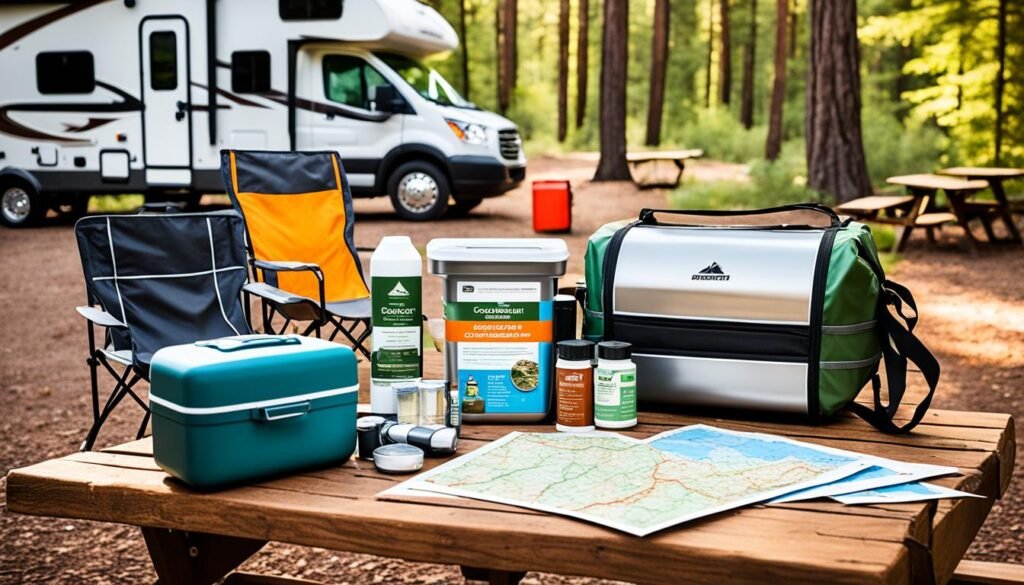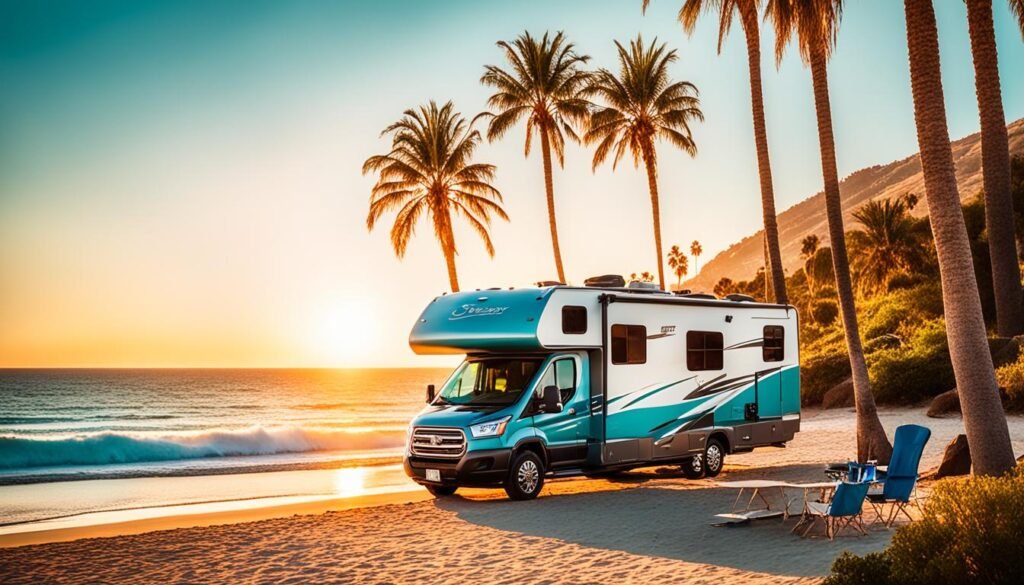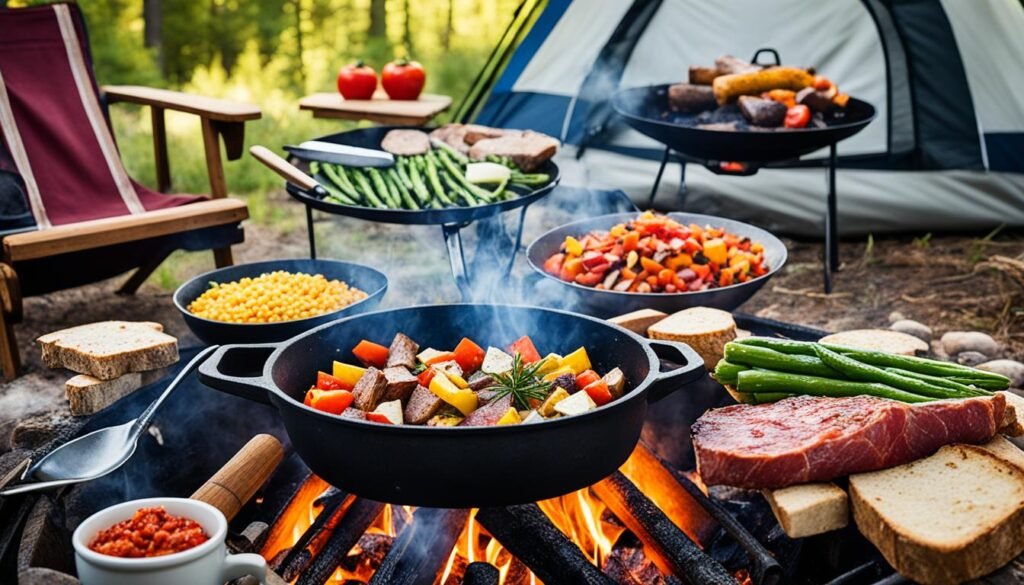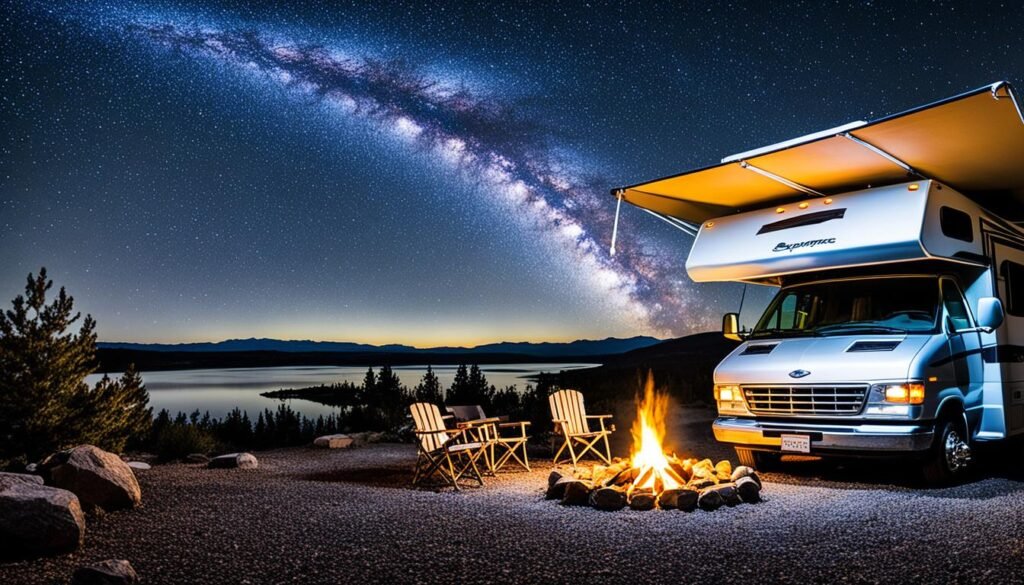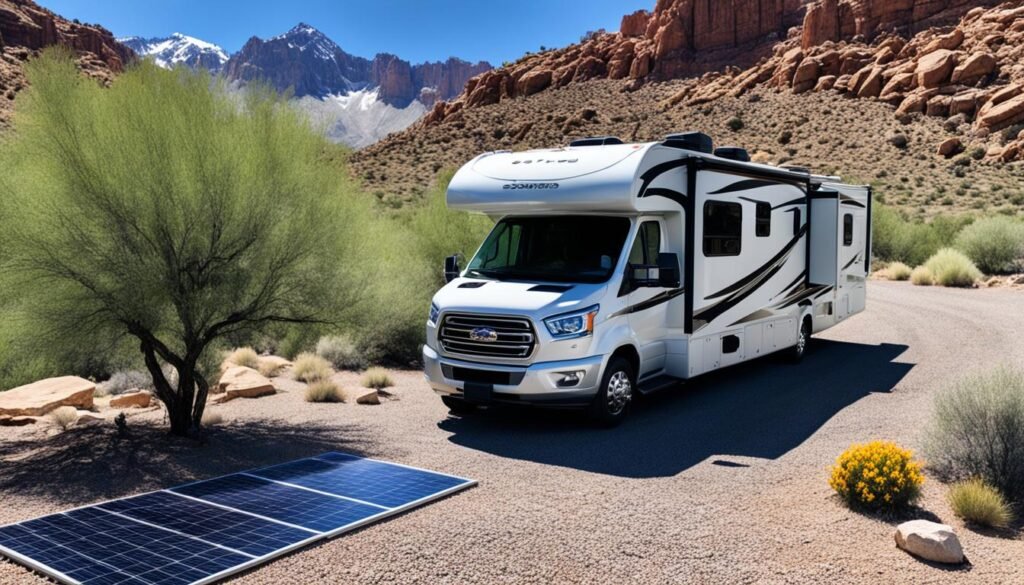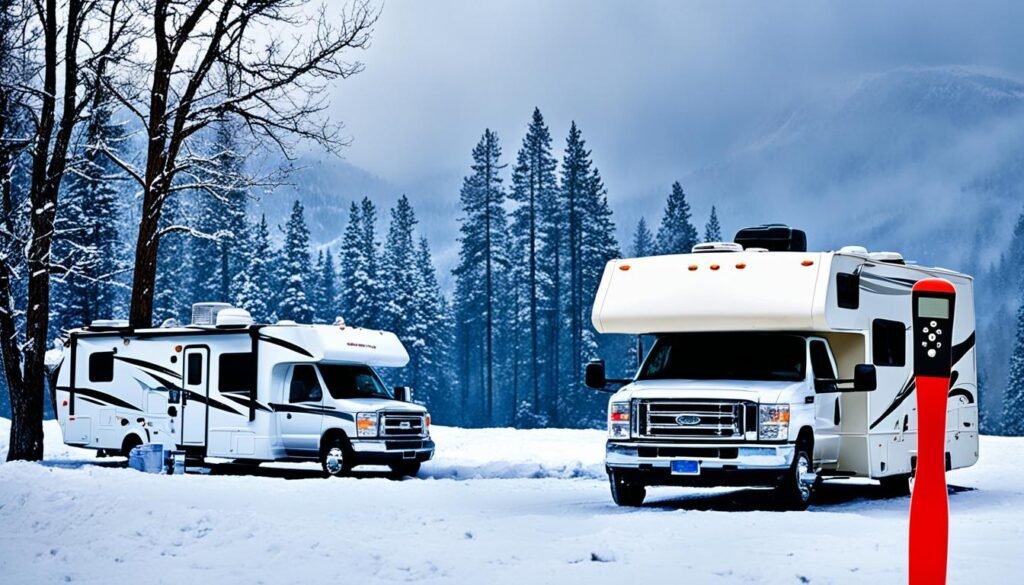RV camping is both fun and a great adventure for newbies. It’s good for quick trips or living full-time in an RV. In this guide, you’ll learn the basics, like costs, picking the right RV, and booking campsites.
Key Takeaways:
- Knowing how RV camping works is key to a good trip.
- Think about the costs of RV life, like buying an RV, campground fees, utilities, upkeep, insurance, and gas.
- You can live in an RV full-time, even with debts. Plan a budget and look into jobs you can do remotely.
- Choosing the right RV is important. Look at different models before you decide.
- Plan your RV trip by picking a place, booking a campsite, and thinking about the services you’ll need.
RV Living Costs: Understanding the Financial Aspects of RV Camping
Thinking about RV camping means looking at costs first. With expenses differing by RV size, style of travel, and location, you should know several common costs. Knowing these helps with good budget planning.
1. RV Purchase or Financing:
Buying or financing an RV is a big cost. It’s important to consider costs for both new and used RVs. Make sure it fits your budget and camping needs.
2. Campground Fees:
Staying at campgrounds while RV camping costs money. Fees change based on location, services, and season. Booking early lets you plan your spending better.
3. Utilities:
Some campgrounds offer full services like water, sewer, and power. Others might offer fewer services or no services at all. Know these costs to plan well.
4. Maintenance and Repairs:
RVs need upkeep and sometimes, repairs. Setting money aside for regular maintenance and unexpected costs is smart. It helps manage these expenses well.
5. Insurance:
Insurance protects your RV investment. It covers the RV, liability, personal items, and more. Look around for the best insurance deal for your needs.
6. Roadside Assistance:
Having help on the road is comforting. Roadside services assist with towing, flat tires, and more. Choosing a trusted roadside help plan is smart.
7. Fuel Costs:
RVs need fuel, like gas or diesel. The cost of fuel affects your budget, especially on long trips. Think about fuel efficiency and plan your trip to estimate fuel costs.
8. Activities and Memberships:
Activities and clubs make camping fun but cost extra. These include fees for park visits and club dues. Planning for these expenses enhances your experience.
9. Groceries and Eating Out:
Planning for food costs is key. This includes buying groceries and eating at restaurants. A balance of cooking and dining out is helpful for your budget.
10. Internet Access:
Staying online is vital for work, staying in touch, and fun. Choosing reliable internet options like mobile hotspots or campground Wi-Fi is important. This helps avoid high costs.
11. Laundry and Subscription Entertainment:
Doing laundry is part of RV life. This includes using campground or laundromat services. Also, consider subscription costs for streaming entertainment. Both are important for comfortable living.
12. Cell Phone Bills:
Regular cell phone costs need budgeting. Choose a plan that fits your needs, including any travel costs. This keeps you connected without surprises.
13. Propane, Water, Sewer, and Mail Forwarding Services:
Costs for propane, water, and sewer services change with your camping setup. Also, if you need mail forwarded while traveling, include these fees in your budget.
By keeping these costs in mind and adding them to your budget, your RV trip can be well-planned and more enjoyable. It helps avoid unexpected financial issues.
Full-Time RV Living: Debunking Myths and Tips for Success
Living in an RV full-time is exciting. It’s a choice many dream about. You don’t need to be debt-free to start. Many people live in RVs while paying off student loans. The trick is to budget and stick to it.
Working from your RV is a great idea. Technology lets you work from anywhere with good internet. This means you can earn while living the RV life.
Looking for ways to make money while traveling? Try campground hosting or different small jobs. Use your skills to find work that fits the RV life. You can also start a YouTube channel or blog to share your journey.
Remote jobs are a top pick for RVers. If you have internet, you can work from your RV. This lets you travel and earn money at the same time.
Internet access is crucial for remote work and staying connected while on the road.
Getting good internet in your RV is possible. RV parks often have Wi-Fi. But, speeds can vary. For stable internet, consider mobile data or satellite options. These are made for RVers and help you work and stay in touch.
Debunking Myths of Full-Time RV Living
Myth: You need to be out of debt to pursue full-time RV living.
Fact: Many RVers still handle debts while living the RV lifestyle. With smart budgeting, it’s doable.
Myth: Full-time RV living means no stable income.
Fact: You can earn well with remote work or jobs along the way. Opportunities like campground hosting or odd jobs keep the income flowing.
Myth: Full-time RV living is only for retirees.
Fact: The RV lifestyle is open to all, from young families to workers. Age doesn’t matter.
Understanding the truth about RV living helps. It means you can enjoy this lifestyle and make great memories on the road.
Choosing the Right RV: Types and Considerations
Choosing the right RV is key for a great camping experience. There are many types to consider. Let’s look at the various RV options and what they offer.
Class A Motorhome
Class A motorhomes are all about luxury and space. Built on a special chassis, they feel like a home. They are best for long trips, with large tanks for essentials.
Class B Campervan
If you like compact and versatile, consider a Class B campervan. They are built on a van chassis and easy to drive. They are small but have everything you need.
Class C RV
Class C RVs are great for families or groups. They have extra sleeping space and can tow more. These RVs are comfortable and convenient for camping.
Tow-Behind Trailer
Tow-behind trailers are flexible and budget-friendly. You can hitch them to many vehicles. They come in many sizes and offer various features.
Fifth-Wheel
Fifth-wheel RVs need a pickup truck with a special hitch. The hitch system improves stability on the road. These RVs are spacious with luxurious amenities.
Pop-Up Camper
Pop-up campers are light and affordable. Easy to tow and store, they are small yet cozy. They provide basic comforts and sleeping areas.
Renting an RV
Renting an RV is a good way to try RV life. RV rentals let you test different models. This can help you find the perfect RV for your adventures.
When picking an RV, think about size, layout, and features that meet your needs. Research and explore your options. There’s an RV for everyone, whether you want luxury or simplicity.
Planning Your RV Camping Trip: Choosing a Destination and Making Reservations
Planning your RV camping trip revolves around two key steps: picking a spot and booking your stay. These are vital for a fun and smooth journey. Now, let’s find out the best way to plan your trip.
Researching Campgrounds and Amenities
First, look into different campgrounds and what they offer. It helps to choose one that fits your needs. Think about hookups, location, and fun things to do there.
Many love camping in national or state parks for their beauty and activities. But, they get full fast, especially when lots of people want to visit. So, it’s smart to book your place early.
Making Campground Reservations
Knowing the check-in and check-out rules is key when booking. It ensures your arrival and departure are smooth. Be aware of the times so there are no hiccups.
Then, decide if you want all services (water, sewer, and power) or just some. Or maybe you like boondocking, which is more basic but close to nature. Your choice depends on how you like to camp and for how long.
Utilizing Camping Apps for Planning
Today, camping apps are really useful for RV lovers. They help find spots, check parks, and plan trips. Here are some good ones:
- RV Parky: Gives a big list of parks and campgrounds, amenities, and reviews.
- AllStays Camp & RV: Lists over 30,000 campgrounds and RV parks to help find the best spot.
- The Dyrt: Lets users look up campgrounds and see what others say about them.
These apps make it easier to plan your trip and find great places to stay. So, start looking up destinations and booking your campground. Keep in mind what you enjoy, the services available, and use apps to make your trip great.
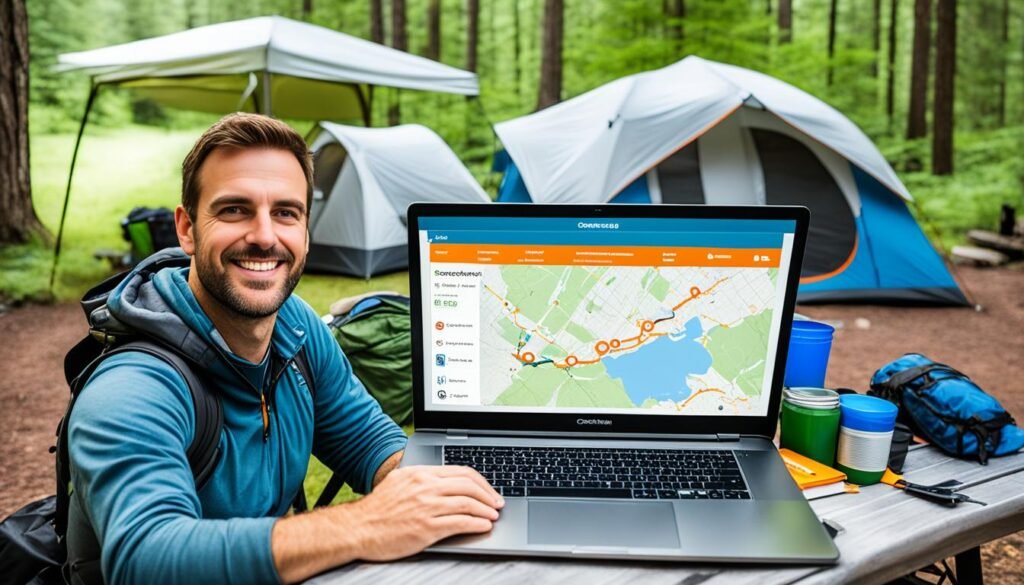
Next, we’ll talk about the important gear for RV hookups. This will get you ready for a comfy, stress-free camping time. Stay with us!
RV Hookups: Understanding the Connections for Electricity, Water, Sewer, and Gas
Powering Your RV: Electrical Connections
Understanding electrical connections for RVs is key. Your RV might need a 30-amp or 50-amp connection. A 30-amp hookup powers basic items. A 50-amp provides more for larger RVs. Make sure the campground’s power fits your RV’s needs.
Quenching Your Thirst: Water Connections
Having water makes RV camping comfy. RV sites offer different water hookups. Full hookups give direct water to your RV. Partial hookups might need filling from a spigot. Always use a clean water hose.
Managing Waste: Sewer Connections
Good sewer connections keep things clean and green. Aim for sites with full hookups for direct sewer lines. Use a sewer hose for a tight, no-leak hook. Follow local rules to protect the environment.
Fueling Your Adventures: Propane and Gas Connections
Propane and gas run many RV appliances, like stoves and fridges. Knowing how to safely refill propane is crucial. Check the owner’s manual for safety tips. Make sure gas lines to your appliances are safe and maintained.
| Connection Type | Description |
|---|---|
| Electrical | 30-amp or 50-amp connections to power your RV |
| Water | Full hookups or nearby water spigots for access to fresh water |
| Sewer | Proper connections and disposal methods for waste management |
| Propane/Gas | Connections for powering appliances and necessary safety precautions |
Choosing the Right RV Hookup Site: Factors to Consider
Picking the right RV hookup site is vital for your trip. The campground you choose affects your whole experience. Think about these things:
Campground Amenities
Campground features can make your stay better. Look for places with:
- Restrooms and showers
- Laundry facilities
- Campfire pits or grills
- Picnic tables
- Playgrounds or recreational areas
- Wi-Fi access
Full Hookups vs. Partial Hookups
RV sites offer different hookups. Full hookups have electricity, water, and sewer. They make camping comfy and easy. Partial hookups might only have electricity and water. Think about what you need before choosing.
Dump Station Availability
Waste disposal is important in RV camping. Look for a campground with a dump station. This saves you the hassle of finding one elsewhere.
Water Pressure Regulator
Protecting your RV’s plumbing is key. Use a water pressure regulator to avoid damage. It keeps water flow consistent and safe.
Think about these factors to pick a good RV hookup site. Your choice can make your camping trip comfortable and fun.
| Factors to Consider | Full Hookups | Partial Hookups |
|---|---|---|
| Campground Amenities | ✓ | ✓ |
| Dump Station Availability | ✓ | ✕ |
| Water Pressure Regulator | ✓ | ✓ |
Full hookups offer convenience with electricity, water, and sewer. Partial hookups, with electricity and water, can be good too. Choose based on your needs for a great trip.
Essential Equipment for RV Hookups: What You’ll Need
Having the right gear for RV hookups is a must for a great camping trip. It matters not if you’re new or have been camping for years. The right gear lets you hook up to power, water, sewer, and gas with ease. Here’s the gear you will need:
- RV Power Cord: A trusty RV power cord connects your RV to the camp’s power. Choose a cord that fits both your RV and the camp’s power needs.
- RV Surge Protector: An RV surge protector keeps your RV’s electric system safe. It protects your gadgets and appliances from electrical harms.
- Potable Water Hose: You need a potable water hose to connect to the camp’s water. Get one made for drinking water that reaches your campsite water hookup.
- Sewer Hose: A sewer hose gets rid of wastewater from your RV. Pick a strong hose with the right fittings for a tight, leak-free connect to the sewer.
- Water Pressure Regulator: This keeps your RV’s water pressure even and safe. It helps avoid leaks and damage by controlling the pressure.
With this vital gear, you’re set to hook up your RV to all needed utilities. This will make your camping comfortable and enjoyable. Let’s look at these items in a picture:
| Equipment | Description |
|---|---|
| RV Power Cord | A reliable cord for connecting your RV to the campground’s power supply. |
| RV Surge Protector | Protects your RV’s electrical system from power surges and fluctuations. |
| Potable Water Hose | A hose for connecting your RV to the campground’s water supply. |
| Sewer Hose | Allows for the proper disposal of wastewater from your RV. |
| Water Pressure Regulator | Maintains a consistent and safe water pressure in your RV. |
Troubleshooting Common RV Hookup Issues: Tips for Resolution
RV hookups can have issues despite being carefully set up. Common problems include trouble with the electrical hookup, no water flow, or a sewer issue. These can be annoying. Yet, most can be quickly fixed. Here are some ideas to solve these RV hookup problems:
1. Electrical Connection Problems
Having trouble with your electrical hookup? First, check the main circuit breaker, fuses, and the campground’s pedestal switches. Make sure they’re on and working right. If still no power, use a voltage tester to find any outlet issues or RV electrical system faults. Should these steps not work, ask the campground staff or maintenance for help.
2. Water and Sewer Issues
Dealing with water or sewer trouble? Start by looking for kinks or blocks in your hoses. Also, check that valves are open and connections tight. Not getting water or having sewer issues might be due to a clog or a problem on the campground side. If so, tell the campground staff or maintenance. They can help fix it.
Always stay calm and kind when asking for help from campground staff or maintenance. They are there to assist and want your camping to be great.
To fix common RV hookup issues easily, follow these tips and ask for help when you need it. This way, you can quickly get back to enjoying your trip, avoiding unnecessary trouble or stress.
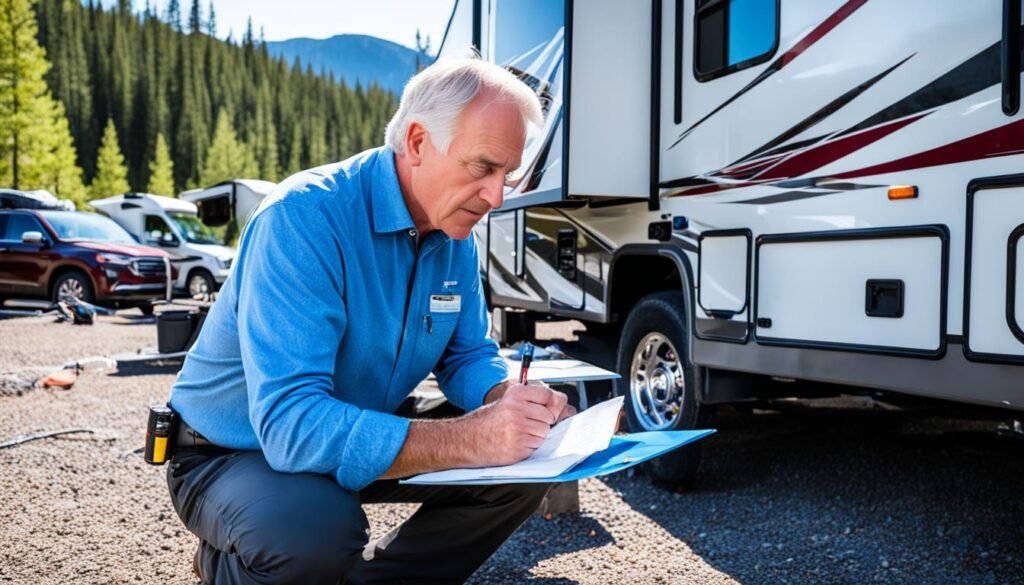
| Common RV Hookup Issues | Troubleshooting Tips |
|---|---|
| Electrical connection problems | – Check circuit breakers and fuses – Test outlets with a voltage tester – Seek assistance if needed |
| Water not flowing | – Check hoses for kinks or blockages – Ensure valves are open and connections are secure – Notify campground staff if issue persists |
| Sewer backing up | – Check sewer hose for blockages – Verify campground’s infrastructure – Seek assistance from maintenance team |
Dos and Don’ts for RV Camping Beginners: Tips for a Successful Trip
If you’re new to RV camping, there are some important things to know. Be careful **not to overload your RV’s electrical system**. Running too many appliances at once can cause problems. Spread out your power use over your trip. If you’re not sure about your RV’s power, check the manual or ask for help.
It’s also key to **monitor your water and waste tanks**. You don’t want to run out of water or have a full waste tank. Check the levels often and try to use less water. Take short showers and reuse dishwater if you can. Always dispose of waste correctly, following the campground rules.
Make sure to **level your RV** right for a good camping experience. An RV that isn’t level can be unstable and damage things inside. Before you hook up anything, level your RV with blocks or jacks. This makes your stay better and keeps tanks working right.
Following these tips will help you have a great time RV camping. Don’t forget to **check out this article for beginners** from The Washington Post. It has lots of good advice. Happy camping!
FAQ
How does RV camping work?
RV camping involves using a recreational vehicle for accommodation. You can travel and stay at special areas. The RV has a bedroom, bathroom, kitchen, and space to relax.
What are the basics of RV camping?
The basics involve picking the right RV and planning your journey. You also need to make bookings. It’s crucial to know about RV connections and rules for a good camping trip.
How much does RV camping cost?
RV camping costs change based on many things. This includes the RV type, place fees, and utilities. Also, maintenance, insurance, fuel, and other living costs. Setting a budget before starting your journey is key.
Can I live in an RV full-time?
Yes, living in an RV full-time is a choice for many. It’s vital to budget well. Finding work opportunities and having strong internet for remote jobs is important.
How do I choose the right RV?
Think about what you need, like, and can spend when choosing an RV. Look into different RV types, such as motorhomes and trailers. Trying one by renting before buying is a smart move.
How do I plan an RV camping trip?
Pick a place to go, look up campgrounds, and book early. Think about what the campgrounds offer and types of hookups. Decide if you want full, partial, or no hookups.
What are RV hookups and how do they work?
RV hookups let you connect to power, water, sewer, and gas. Knowing how to link up is important for comfort while camping.
How do I choose the right RV hookup site?
Look for amenities at campgrounds, types of hookups, and if there’s a waste station. These factors matter when selecting a hookup site.
What equipment do I need for RV hookups?
You’ll need a power cord, surge protector, drinkable water hose, and sewer hose. A water pressure regulator is also necessary.
What should I do if I encounter issues with RV hookups?
For issues like bad electrical connections or water problems, check the breaker and fuses. Ask for help from other campers or the staff if needed.
What are some dos and don’ts for RV camping beginners?
Do avoid overloading your RV’s electrical system. Keep an eye on water and waste tanks. Make sure your RV is level before connecting. Don’t run too many appliances at once and don’t skip maintenance and safety steps.

